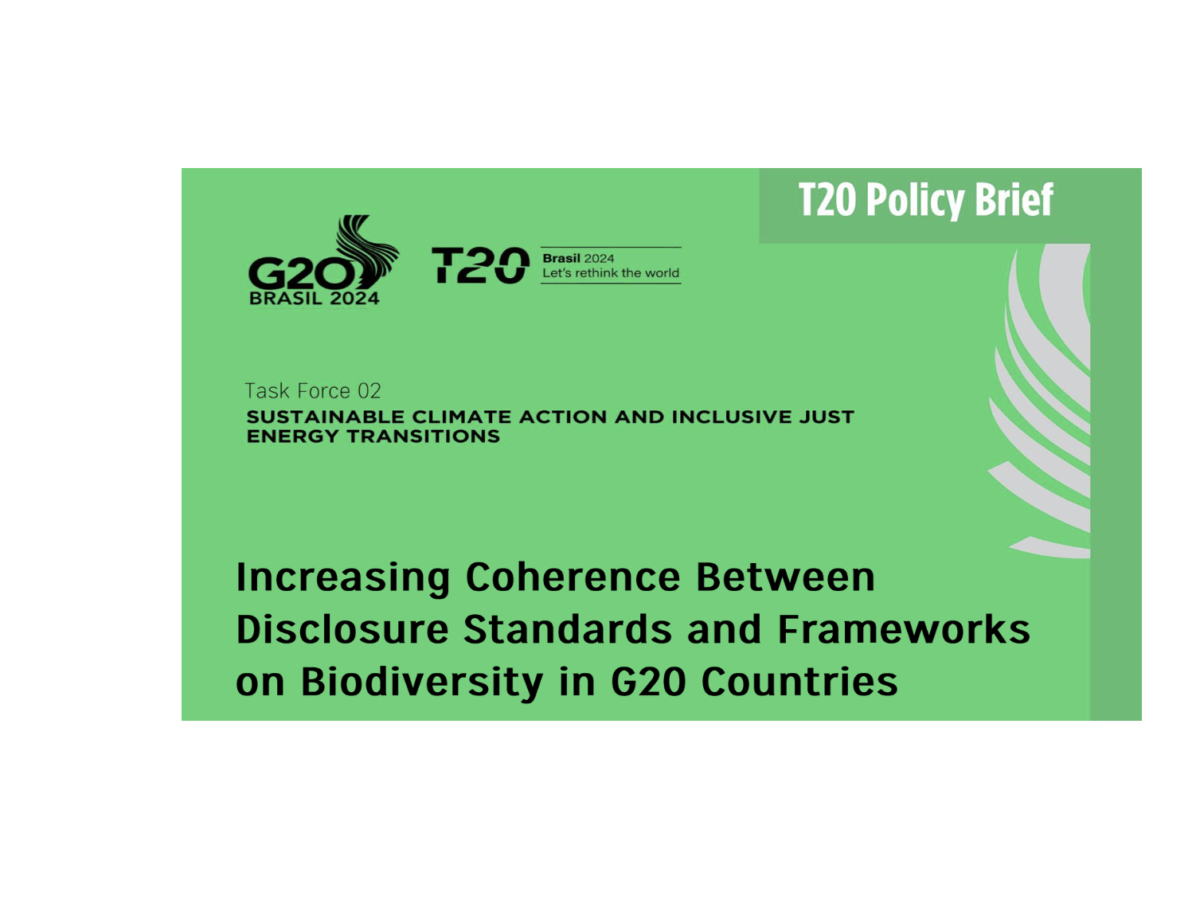
Increasing Coherence Between Disclosure Standards and Frameworks on Biodiversity in G20 Countries | ThinkTwenty (T20) Brasil 2024 – Official Engagement Group of G20
September 19, 2024
The recent adoption of the Kunming-Montreal Global Biodiversity Framework (GBF) marked a significant milestone for halting and reversing biodiversity loss. Its action Target 15 addresses transnational companies and financial institutions, encouraging them to monitor, assess, and disclose biodiversity risks, dependencies, and impacts. As biodiversity disclosure frameworks and standards evolve, harmonization becomes paramount. The users of disclosure information seek to systematically assess and incorporate risks and impacts into their decision-making. To do this, they need reliable and comparable data, but substantial inconsistencies and ambition gaps between disclosure standards and frameworks hinder comprehensive understanding and action on firms’ sustainability performance.
Further, firms are unsure which sustainability reporting standards to follow to maximize transparency and fulfill data demands they (will) receive from downstream business partners. This T20 Policy Brief presents targeted recommendations to increase the coherence between biodiversity frameworks and standards, whilst keeping ambition levels high. The issue is extremely important for the effective transformation of the economic system and business models towards a greener, more inclusive economy and an equitable, nature-positive world. Our recommendations stem from comprehensive overview of the state of disclosure for nature and biodiversity in the G20 countries, as well as in-depth and evidence-based research conducted by think tanks in Germany and China and private sector organisation in Brazil.
As part of the G20 Sustainable Finance for Nature & People project, led by the Post2020 Biodiversity Framework – EU Support project, funded by the European Union and implemented by Expertise France, this T20 Policy Brief was elaborated in collaboration with the Brazilian Business Council for Sustainable Development (CEBDS) and the Institute of Finance and Sustainability, from China.
You can read the Policy Brief below:
Recommendations provided to the G20:
1. Foster government engagement and coordination towards more aligned and interoperable biodiversity disclosure standards that better reflect local realities.
- The G20 should support international cooperation on biodiversity disclosure to increase corporate transparency and accountability…
- …while promoting and coordinating between G20 governments to invest in a better reflection of local and regional realities.
2. Foster government support and incentives to accelerate the adoption of disclosure standards by the private sector.
- Develop comprehensive national strategies and roadmaps integrating nature and climate objectives
- Support pilot studies to identify and overcome roadblocks in adoption.
- Develop evaluation and rating systems for biodiversity-related disclosures and create recognition programs.
3. Take a sectoral approach and support for sector-specific working groups or forums.
What is the Think20 (T20)?
Think20 (T20) is an official Engagement Group of the G20. It serves as an “idea bank” for the G20 by bringing together think tanks and high-level experts to discuss policy issues relevant to the G20. T20 recommendations are synthesised into policy briefs and presented to G20 working groups, ministerial meetings, and leaders’ summit. This helps the G20 deliver concrete policy measures.
What is the Task Force 2: Sustainable Climate Action and Inclusive Just Energy Transitions?
Task Force 02 (TF02) is dedicated to addressing critical facets of climate action, with a particular emphasis on issues related to energy transitions and a central focus on inclusivity and justice. To learn more about this Task Force, click here.
